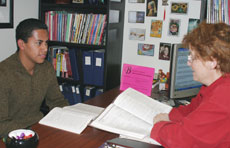 Jessica Swartz
Jessica SwartzAcademic advising is designed to help students get through their college years as smoothly as possible, but sometimes it can lead to bad advice.
San Diego State anthropology senior Stisha Vaughn met with an advisor in the Academic Advising Center when she had to drop a class she was scheduled to take because it was no longer being offered.
The advisor told Vaughn there was nothing she could do for her and gave her no alternatives, she said.
“If possible, give me another option,” she said, “or at least just be a little more polite.”
She said she felt the advisor was rude and bitter and did not try to help her at all.
Grossmont College junior Matt Gilmer had an SDSU advisor tell him to take the wrong class. He said he was told to take a math class that was a level higher than what he needed to transfer, causing him to fall behind a semester because he needed to complete the actual math class he was supposed to take.
Gilmer said he felt his advisor “should have taken a look at (him) personally and not just as another student – wanting to get (him) in and out within five minutes.”
This advisor’s bad advice will force Gilmer to take summer school classes in order to graduate on time, he said.
Many students feel advisors at their college do not give them the attention they deserve. Some suggest more advisors be available, while others simply ask for some compassion.
Selma Reed, associate director of the Office of Advising and Evaluations, assures students the Academic Advising Center’s main purpose is to help students get through the university as efficiently as possible and to encourage them to take advantage of all the services the campus has to offer.
She said all advisors are fully qualified, either possessing or working on their master’s degree. They all participate in a training program educating them on the general education patterns, policies and procedures at San Diego State.
Reed said SDSU offers a “dual model” of advising, which means all students really have two advisors.
Students have an advisor in the Academic Advising Center who can advise them on graduation requirements, general education and university policies. In addition, students have a second advisor who exists within their major department. This way, students receive a more specialized advising system.
Communication sophomore Kristie Beckman has found this system to work well. She said she had a very pleasant experience with her advisor when she did not have enough credits to graduate.
“She totally worked out my minor and everything to make sure I didn’t get all screwed up,” Beckman said. “I couldn’t figure it out on my own.”
She said her advisor succeeded in helping her get on track for graduation.
USD psychology senior Jeneen Wallig also gave high praise about the advising system. Being the first in her family to go to college, she said she heavily relied on her advisers for the right information.
“They advise you to take classes based on your past grades and activities and give you a workload that you can handle,” she said.
She said she appreciated the fact her advisors were realistic; however, she did feel a bit rushed by them.
Reed said improvements are constantly being made within the SDSU advising program. There will be an advising fair in November to get the word out about advising opportunities available.
In addition, she just began a student advisory board that meets monthly to collaborate with students on how to improve the advising services. All advisors are automatically subscribed to a list server through which they receive important updates when any changes take place.
“We’re on our way,” Reed said. “There are a lot of things going on to continue to provide better services to students.”






